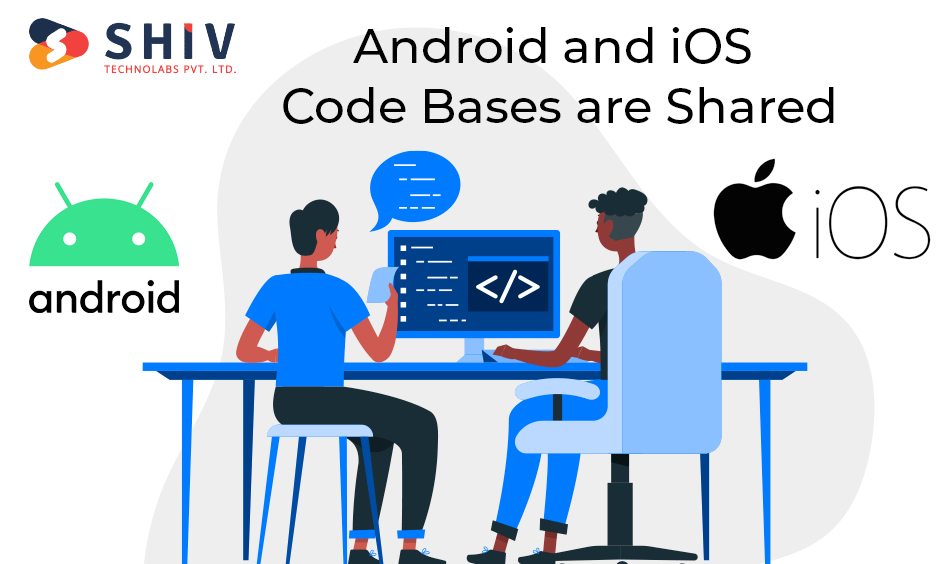Table of Contents
We live in an age of technology where progress can be made, changed, and disappear within the blink of an eye. Update messages for apps are something we are all familiar with. Today, we are going to discuss react native hybrid app development.
This is one example of how fast the world is changing. Somebody said that unlearning was more important than anything else if you wanted to grow from where you were.
A combination of web technology and native execution creates Hybrid Apps. Be sure to hire a developer to create a React native app. HTML5, CSS, and JavaScript-based apps can run on Android or IOS devices using a native container.
Many apps were built through Hybrid formatting until React Native’s future existed, which simplified programming and maintaining the application for developers.
Why React Native for Hybrid App Development?

One must initially adopt one of the following options to develop an application: developing a hybrid app using HTML5 or coding for two native apps, working the same way in Android and IOS. But nowadays, everything has changed.
There have been changes since the introduction of React Native that made everything easier. Because of this, what follows is justifiable for why switching to react native hybrid app development will have us go towards a react-native future.
# Same Aesthetic Design as Native
If you structure your application via React Native, you get all the rewards of a hybrid app and eradicate all limitations usually present in a hybrid app.
A Hybrid application is a web application that has been placed in a native container, which makes it mobile-friendly but not mobile-friendly at all. No web view is given through reacting native, which works perfectly on mobiles.
The prime task of a native app is to be smooth and compatible with mobile devices while ensuring the best User experience. That is exactly what developers do with React Native.
# Android and iOS Code Bases are Shared
React Hybrid App has previously resolved the issue of writing different codebases for different platforms. React Native is a one-code-based system that can be used for multiple purposes.
This will help reduce developers’ time, which can be put to other uses, and ensure users have app versions suitable for their mobile devices.
However, since functionality varies from platform to platform and some codes must be written based on platform specifications, 80% of the code base is the same.
# Programming Model Just Like ReactJS
Facebook made React Native after making ReactJS; hence, all essential modules included in ReactJS are also in React Native. Consequently, many developers prefer to use it as it is one of the greatest libraries when the need arises in web development.
Therefore, this also makes React Native one of the great tools when referring to mobile app development. Thus, we can point out an underlying benefit for ReactJS developers working with React Native.
# Large and Diverse Ecosystems
Since the inception of React Native, a lot has changed. Many big shots in the industry have switched to React Native because it has a range of modules and is freely available.
Despite having many libraries before React Native, developers face several issues as they code their applications for a better user experience.
React Native makes it easier and less complicated for developers to switch to. React Native Dimensions allows for customization of anything not supported by the components unless specified otherwise.
# Part of many Tech Giants
It would sound surprising if we were told that there are almost no Hybrid apps. Some notable examples include Facebook, Reddit, Netflix, Bloomberg, Discovery VR, and many more, which have been made using React Native.
No company can compromise its user interface if it wants to survive in the market as long as it provides the best user experience, which goes hand in hand with React Native.
The time when traditional hybrid app frameworks were used to build apps is gone. For now, it is all about React Native unless some astonishing technological breakthrough occurs.
JavaScript is a language that is easy to learn and teach as well. This means that debugging and testing can be done. Additionally, React Native is completely based on JavaScript; thus, it becomes very simple for developers to work with React Native.
Developers can complete their tasks quickly and easily through JavaScript. The fact that it is not heavy in size and requires no compilation or any other process before execution makes JavaScript the only preferred choice by many developers.
# Reduce & Reuse
It’s just one of the most effective tools for creating reusable components. As earlier stated, react native has a single codebase for multiple platforms, saving developers from doing repetitive work.
In the development process of an application, React Native’s reusability aids quick launching and navigation through the app while also providing room for improvements. In this light, React Native Future looks bright.
# Built for Mobile
Any company needs to develop mobile applications to be mobile-friendly, making React Native the best option for them. React Native exists to provide mobile app assistants.
As more and more work continue to shift towards mobile, merging people with convenience and fast growth, it is important to have a mobile-friendly application. Almost all applications are now react hybrid apps. Therefore, you should know How to Create a Hybrid Mobile App Using React Native. It will help you in the future.
# Numerous Tools & Libraries
React Native is a significant tool for organizing a mobile application. Its beta testing proved that it’s one of the best solutions for any mobile application problem with User Interface, making it popular among developers.
The cross-platform application development using React Native instead of a Hybrid app gives the company an advantage. Also, React Native provides some other tools, such as integration libraries for maps, standard UI controls, etc.
# Reduced Cost & Time
A single source can answer every mobile application problem, helping developers deliver on time. Moreover, this open-source platform allows one to access it for free, thus making it quite appealing.
An interesting fact is React Native developers’ time reduction is about 33 percent with a single codebase that can be applied to different platforms.
# Animations
The way React Native is being used by the major industry giants, especially in social media, is remarkable because of its smooth animated components.
This will help provide a better user experience, eventually leading to improved app ratings and reviews. After all, everyone knows that seeing is believing.
# Hot Reloading
One of the features in React Native is Hot Reload, which makes it possible for the front-end application to be updated as soon as you have done some coding on its back-end. This feature amazes us because it allows us to update our UI component without reloading the entire application.
Developers also experience the possibility of navigating and making changes wherever they feel like while dealing with any missing elements through modifying react-native JavaScript or code. It’s not only because we have this attribute that we can now look at our ever-changing world.
# Complicated Harmoniousness
React Hybrid App is the most suitable for combining other devices. It leads to a decrease in a developer’s effort while writing additional codes for combining device components like cameras, access to the gallery, GPS, and many others.
By doing so, it reduces developers’ workload and also makes the application user-friendly.
# Community Support
React Native has an enormous community with millions of developers. This has made it popular ever since its beginning when it was an open-source version in 2015 on GitHub.
This is why on Stack Overflow alone, it gets to have all those likes and comments, yet they all come from different users or contributors. It has 9000 users in Discord chat, 14.5k users in the subreddit, and 88.2k stars on GitHub.
# Third-Party Plugin Compatibility
React Native has a wide selection of third-party libraries that can be easily integrated. This small database library is also open-sourced through the third-party plugin, offering full functionality. This aspect significantly favors its users, who can access various data and modules necessary for creating their applications.
Also Read:-
Hybrid Application Challenges

Developers have experienced several challenges that made them use React Native, alternatively known as React Native App Examples, over Hybrid apps in general.
# User Experience
With the advancement of technology, people are becoming more tech-savvy. They prefer everything to be organized and simple.
So, the companies must know that they are dealing with Nomophobia (smartphone addicts) who like using apps that contain multiple features and that can easily be accessed, as these people are the ones who rate the apps. The hybrid app doesn’t give them this satisfaction.
# User Interface
Today, customers are very sophisticated due to increased awareness regarding any product in the market. Hence, it takes a lot of work for the developer to create awesome software that will appeal to many.
When you download an app, you look first at how attractive its app images are before scrolling down for reviews. The first impression in a user interface is made by Hybrid Applications, which disqualifies it from being considered among the best apps ever designed.
# Performance
The performance of hybrid apps has been in question for a long time. Poor offline support, frequent crashes, slow speed, and poor network conditions are among them.
This also makes the app less user-friendly, resulting in bugs and poor performance. In addition, Hybrid apps take too long to open and start disappointing users.
# Absence of Topflight Applications
No single case of an app has moved from Native to Hybrid. However, some apps have gone from Hybrid to native, like Bloomberg, Uber, Reddit, Discovery VR, etc. This list goes on forever. This is because Hybrid does not provide premium quality, which the app gets through native.
# Improvement of React Native over Hybrid Apps
React-native overcomes several challenges facing hybrid apps. One of the biggest challenges that React Native has solved is web-view.
React Native apps run natively and thus are not confined to web-based UI elements. Therefore, it provides a good user experience.
Also, this React Native app has another remarkable feature: a single codebase accompanying the UI element. Such a thing cannot be said for any other hybrid app.
This makes the front end of the application usable; thus, users may feel comfortable using it at first once they start. The react-native dimension also enhances your developer experience.
Frequently Asked Questions (Faqs):
# Why would someone choose React Native for hybrid app development over the traditional hybrid frameworks?
These clunky performances are due to the excessive reliance on web views in most traditional hybrid frameworks, which do not offer a native sensation. React Native filled this void by employing native components wrapped around JavaScript, enabling a smooth user experience and high performance on iOS and Android platforms.
# Can React Native be considered cost-effective and time-saving compared to native app development?
Yes! The “write once, run anywhere” mindset behind React Native allows you to build a single codebase that works for iOS and Android. This eliminates the need to create separate apps natively for each platform, therefore lowering the React Native App development time costs.
# Is it easy for web developers to move to React Native?
Web developers who know JavaScript and JS frameworks such as React will find the learning curve gradual. With similar syntax and core ideas, they can quickly learn React Native and start making mobile applications with it. This is a major leverage point for firms with existing web development expertise.
Conclusion
React Native framework has an incredible range of features that provide a new way for react native mobile app development companies to address the problems that hybrid apps may face.
Some well-known industry players use React Native to present unbeatable UI/UX and leverage iOS and Android user bases to propel growth. So, it can be said that in the future, hybrid apps will be more based on React Native.
We have experienced React Native developers who can meet every requirement of yours. You can get skilled React Native developers from us for your full development needs. Our React Native developers create high-quality cross-platform mobile applications.




















